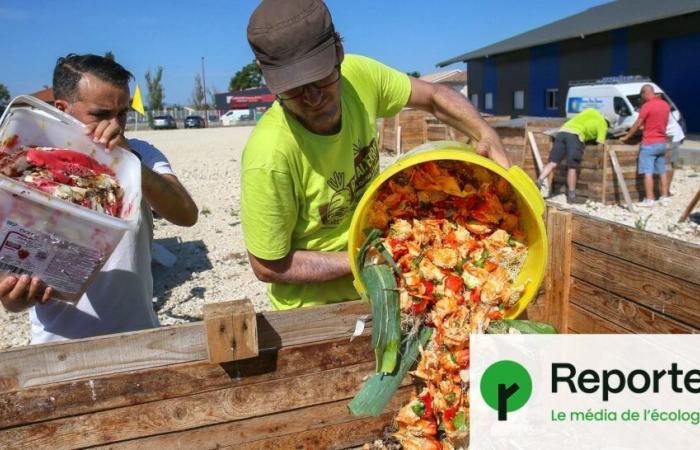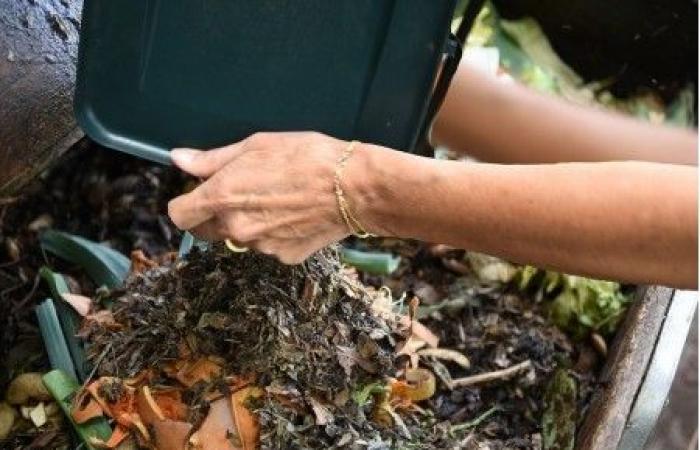« We feel great disappointment in the face of this very insufficient assessment. » Noémie Brouillard, project manager at Zero Waste France, does not mince words to describe the state of sorting at the source of bio-waste in France, one year after its obligation.
Since 1is January 2024, in accordance with the anti-waste law (Agec) of 2020, all French people should have had access to at least one of the existing organic waste sorting solutions: compost bin at the bottom of the garden, voluntary contribution point to the street corner, shared bin in the courtyard of the building, separate door-to-door collection… An ambition which, as this association manager reports, has unfortunately not been able to find fertile ground in the majority of communities . At 1is July 2024, only 39 % of French people had access to a sorting system at source, according to the Ecological Transition Agency (Ademe). This delay reveals the shortcomings of a policy of generalization of sorting, unevenly deployed across the territory.
« The deadline is not new, communities have had time to prepare »underlines Noémie Brouillard. She dates the beginnings of the project back to 2015, with the law relating to energy transition (LTECV), before discussing the European directives from which the Agec law derives.
Regretting the lack of anticipation on the part of communities, she points out that the lack of sorting of food scraps and green garden waste contributes to unnecessary congestion in landfills and very energy-intensive incineration. As this waste is composed of more than 80 % water, it takes more energy to burn them than their combustion provides. Conversely, recovering biowaste makes it possible to nourish the soil through composting or to produce biogas through methanization. Today, bio-waste in household waste represents 83 kg per inhabitant each year.
A shared responsibility
However, for Zero Waste France, the slow deployment is a shared responsibility. L'ONG pointe « the absence of restrictive measures » and lack of financial support. The State does not plan to sanction municipalities which do not have an action plan for sorting at source. « As there is no sanction provided, public policy is less incentive, especially for communities that lack resources. »indicates Noémie Brouillard.
Compost bin in Nantes.
© Laetitia Notarianni / Hans Lucas / Hans Lucas via AFP
According to Ademe, the median cost of biowaste management amounts to 21 euros/inhabitant/year — or nearly 2.1 million for a town of 100,000 inhabitants. It varies depending on the method used: separate door-to-door collection is often the most expensive (25 euros/inhabitant/year). Only 20 % of households are covered by this solution.
Communities tend to resort to individual or shared compost, especially in rural areas, where chartering a collection truck is more expensive given the distances.
Territorialized needs
Grenoble Alpes Métropole is, for example, compliant with the Agec law. With a first waste master plan launched in 2017, the community of 450,000 inhabitants chose a mixed solution. Separate door-to-door collection covers 320,000 inhabitants. Local management of individual and collective composting takes care of the rest of the rural and mountain communities.
Read also: From Lyon to Poitiers, these cities which have already switched to compost
Other communities, such as the metropolis of Bordeaux, are experiencing a greater delay. Anna Nieto, project manager for the Strategic Waste Plan, explains this in particular by the necessary restructuring of the waste service once the plan is adopted in March 2022. « We had to expand the teams, recruit, launch markets, carry out field studies, which takes time. »
Having started the distribution of individual composters in 2012, the community noted a peak in requests at the end of 2023, with residents wrongly thinking that they had to comply with the law on their own. The metropolis still has to distribute 30,000 to equip the entire extra-ring territory ; and 1,600 voluntary contribution terminals are planned for 2026 in the intra-ring zone. Bordeaux Métropole hopes to maintain the current pace with a long-term wish to have its own internalized collection and sorting unit.
« A hammer blow for our finances »
The State set up a Green Fund for territorial transition in 2023 in order to finance sorting equipment. This aid covers equipment costs, but does not provide much support for sorting support and maintenance after installation. Despite the delay in the agenda, France Nature Environnement (FNE) welcomes the improvements made. However, she points out the amputation of this fund last April, with a loss of 20 %, falling to 2 billion euros.
Bordeaux, for its part, submitted its first request for 4 million for 2025, but with the reduction in budgetary envelopes, it expresses doubts about its validation. The 2025 horizon and the current political instability tarnish the diagnosis: « We fear a further reduction in the Green Fund for the coming year »worries Pénélope Vincent-Sweet, biowaste referent at FNE.
Constructing budgets for 2025 is a real challenge, confides the president of Grenoble Alpes Métropole, Christophe Ferrari. According to him, it is a matter of« a hammer blow for our finances ». He disavows the injunctions to save 10 to 20 million euros on his overall budget, a reduction of 20 % of the metropolitan envelope. A « absolute inconsistency ».
38 % of French people insufficiently informed
The issue around communication is the last main obstacle to the generalization of sorting, report associations and elected officials. Many are calling for a national awareness campaign to remedy the information deficit: according to an Ademe survey, 38 % of French people surveyed say they are insufficiently informed about sorting solutions at source.
THE ONG see it as an emergency, when the Ministry of Ecological Transition declared that it was waiting for 1 in 2 inhabitants to be covered before launching a national communication strategy. The president of the Grenoble metropolis nevertheless recalls that the success of their sorting strategy is largely based on « teaching and support ».
The metropolis has deployed significant means to raise awareness: setting up sorting ambassadors, master composters in condominiums and even door-to-door distributions of biodegradable bags. Thinking about smaller communities, Christophe Ferrari maintains that « the State has a major role in supporting transition issues, particularly to compensate for territorial inequalities ».
Zero Waste France suggests that the State establish quantitative thresholds for progressive support. The agenda is very ambitious: 39 kg per capita for 2026 and 15 kg for 2035.
legend







